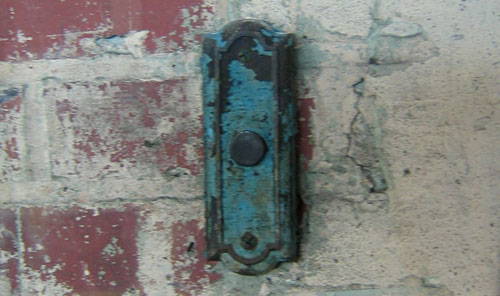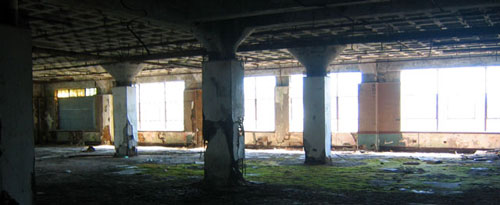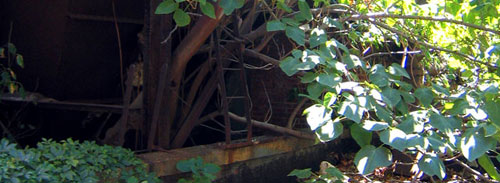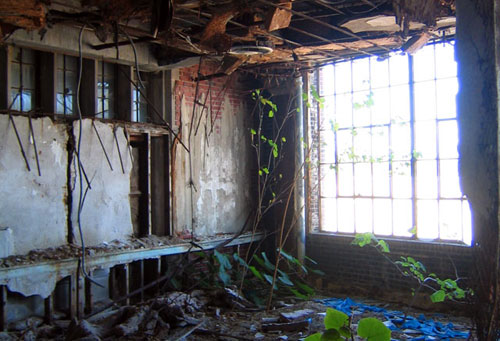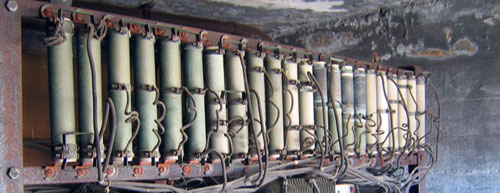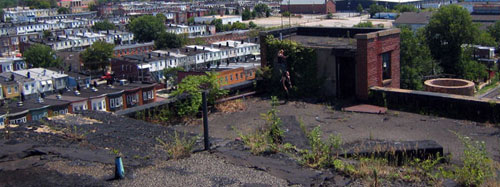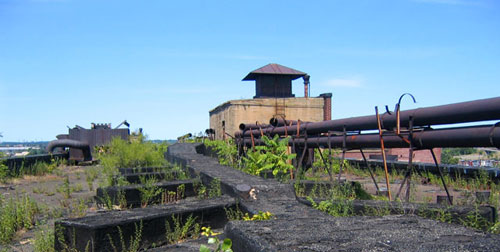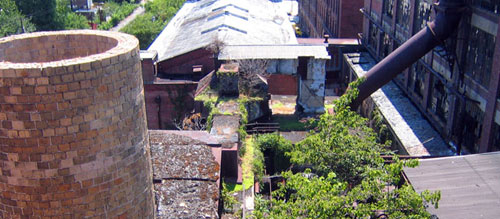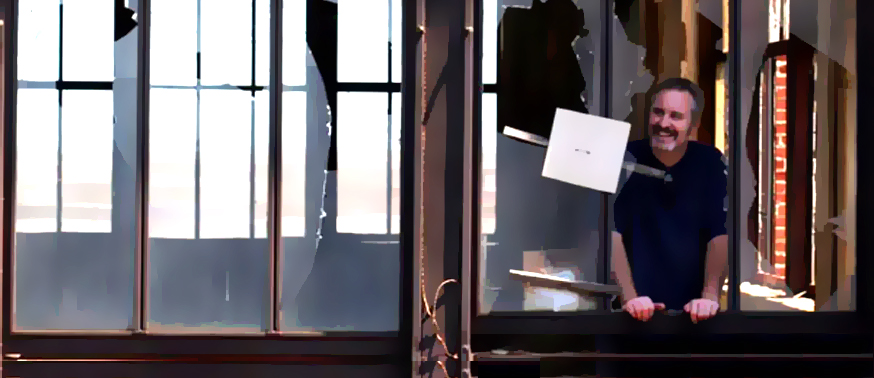19 August 2007
Maybe you don’t even think about it anymore, what’s back there. Maybe you’ve gotten so used to the impotent presence of that painted-over metal door that’s right behind the workbench where you labor in a rented space in the ruins of a colossal turn-of-the-century factory that’s been rusting like a fleet of sunken ocean liners for longer than you’ve been alive.
You tried it, of course, but it’s stuck fast and there’s work to do, so you shove your bench against the wall, blocking off the residual temptation to keep on trying. All the neighboring spaces are rented by cabinetmakers and duct fitters, who thrive in the raw, dusty spaces of the old place, and it’s probably just one more of those guys back there, dutifully turning out a custom kitchen for someone who can afford it.
Thousands of men used to work in the factory, but times change.
After it’s all over, when you’ve packed up and moved the workshop out until the next grant comes in to start it all up again, the heady moment of completion revives old instincts. You gather a group of fellow travelers and start to look for that hidden, magical place on the other side of the world.
Industry is so much the landscape of this city, or it was.
Nothing is guarded.
On an old loading dock, now behind corroding corrugated sheetmetal and bent-up fencing, the door to the shipping manager’s office, built as beautifully as an Art Deco ticket kiosk, is open just enough to let you in. In a dash, dodging the sound of voices coming your way, you’re in, up stairs with streamlined rails and steps so covered with plaster fallen from the ceiling as to be almost a ski slope, you’re in, and it doesn’t take long to find what you’re looking for.
The other side of that door.
And you hope and dream and too easily yield to despair, always hoping there’s an Oz to escape to, somewhere rare and glorious, somewhere to remind you that there is somewhere to go when you find yourself caught up in a kind of life that’s just too much to take in.
It’s too much, all too much, so the doorways disappear behind workbenches, appliances, bookshelves, suspicion, doubt, and uncertainty, until this meager place where we’ve trapped ourselves is all that’s left.
So who comes knocking at those doors?
Do you claw at those gateways only when things really wear you down, when you’re too weak to pry them open? Do you hear the sound of something on the other side and wonder if someone’s finally come for you, to rescue you from the sore times?
It just all gets so tired, sometimes, like all the joy and wonder in the world is finally all used up. The ground under our feet gets as hard as our weary hearts, as heavy and unyielding as concrete weathering away in an empty place like this, and still, you always hope there’s something more, even when you’re feeling bitter and cynical enough to suspect it’s probably just one more disappointment.
This old factory should have burned to the ground so long ago, all but for the fact that there’s so little left to burn. Even the paint and linoleum have long since dried out, curled into little twists and flakes, and blown away through the shattered windows.
Still, you step into the immense space that was right there all along, just feet away from your workbench, where birds nest and fly free in this distinct universe and where there’s more than enough room to run until you can’t catch your breath, enough openness and solitude to give you space to dance like you’ve never danced in your whole life, enough of a track to ride a bicycle in circles until you’ve covered a thousand miles in your own thoughts.
It’s just a very, very large empty room, but that’s just fine.
Everywhere, the machines are still, frozen where they were left decades ago, rusted into place, stuck between floors or locked into the interim poses of their once-important tasks forever and ever. You can’t help but see it all with a kind of awe, at the scale and weight of all this, of what used to go on here and what it’s all come to.
It is so arrogant, this love we have of our own self-hatred, a perverse inversion of the puritanical streak that’s still so deep in the collective soul in this country. It is so easy, so obvious, to look on these ruins with horror and disdain, to say “well, this is what happens,” even when that’s more or less the essential dictate of the evolutionary clockwork we’re all caught up in.
Here and there, there is still power flowing, still 480 volts of current running through inch-thick braids of wire with insulation dangling like snake skins, and you can’t stop yourself from touching the switches and buttons that call to something primal in us.
Touch me.
Some ignore us, some reward us with terrifying shrieks of metal twisting as unlubricated machines the size of cart horses struggle to return to the illusion of life they once had, sometimes it’s just a light bulb here or there, or a little mechanism that emits a steady, desperate buzz, just below the ceiling.
Mostly, these places are just dead, it seems.
You hear voices, wonder what it would have been like when everything was roaring along at full tilt, all those thousands and thousands of hands at work, capping bottles and forming beer cans and making patented corks and seals.
You wonder, too, if there will ever be that much going on for you, if you’ll ever have that stretch of thunderous, clattering, insane industry, when whatever you’re meant to do in this world really starts to happen, all at once, all fed from the same source of high-tension electricity.It’s too easy to remember lives you never lived, eras that ended before you came along, and think you’ll never find that source. You sit at your keyboard and write and it’s almost too much to know that Shakespeare ever existed, or that Ginsburg howled or Joyce rambled or the writers of Laverne & Shirley ever gave Laverne another glass of milk and Pepsi. You sit there, clutching your guitar, paralyzed by Hendrix, Clapton, and the ghosts of the unknown greats out there.
Is the weight of history too much?
Maybe you’re still sitting on a book that’s not finished, not because you don’t have stories to tell or courage to open yourself up, but because life just got too complicated all the sudden and left you unsure which way to turn. Maybe you daydream about coming close to the mastery of color that defines the magic of Matisse, right down to when he was so sick all he could do was cut out shapes, or think that one day, you might just catch the right wave, or ride the right slope, or find the one person you think will finally understand you.
Maybe you stand there, in the center of one more of these worn-out places, surrounded by rust and crumbling mortar, looking through the holes in the floor to the floors below and below and below all that, and feel that gripping, stunning feeling of panic, like you’re falling, like you finally understand where all this ends up.
Everything you do will crumble and fade.
Everyone you know and love will leave you behind.
This is the ultimate destination for everything, this ruin of industry, where even the biggest giants come crashing to their knees.Why do you even open these doors? Is it the nature of doubt, or the fear of disappointment, something that calls for confirmation, as if to show yourself, once and for all, that nothing will ever change?
So you lose yourself in that feeling, in that abandon.There’s freedom in surrender, even when it’s surrender to failure.
Your stomach rumbles, your head aches a bit, but you’re in the presence of fellow travelers, and something of their energy pulls you along, presses you forward, and that’s enough.
The old tiles crackle and break underfoot, the scenery changes, from grey to grey to grey to fading colors fading to grey, but things are never so simple.
The green is startling, jewel-like.
How do things grow here?
There is no soil.
It is that old arrogance, that old ego at work again. For all we’ve made, for all the stories we’ve told and the adventures we’ve had, built on wonder and cruelty and ingenuity and selfishness and more, all we seem to relish is the possibility that all that’s left is destruction. We’re gonna blow up the world.We’re gonna destroy the planet.We’re gonna end life as we know it.
We’re so goddamn vain. No wonder that comes back to haunt us, to dig into our souls like tapeworms, telling us that nothing will ever matter, because it all ends up in ruins.
Why bother?
That question comes to me too much. I sit at my keyboard, and I think I’m writing something good, something that feels generative, the version of that feeling of joy that comes when you take in some kind of amazing experience, except going the other way, and the question comes.
Why bother?
There are so many good answers, but you never seem to remember them when you can’t help but ask that bleak, draining question.
If only it were easier to stay focused, to avoid that little gap in confidence that lets you come to ignore the unopened door. If only that paradoxical combination of arrogance and self-hatred wasn’t so deeply entwined with our nerves and sinews and capillaries, so tangled that it’s hard to know when or if we can slip out of the net.
We actually think we’re big enough to destroy the world, powerful enough to stop the green, whether that comes from our tedious liberal self-disgust or our grim, prudish righteous puritanism, where we think even god must hate us.
If only it was easier to find focus, and hold it—how things would change.
If only it was as easy as finding a doorway.
The rails of the stair have broken free, rusted away where they were welded, eighty or ninety years ago, but you try the tread with a toe, then a sole, then a little weight, and it holds. Anyone with sense would see this place as nothing more than a disaster waiting to happen, but maybe we all need that disaster, that pending calamity, to keep our hearts pounding, the blood rushing, the fine hairs on our forearms standing almost on end in an ancient evolutionary response to the possibility of danger.You skip the stairwell that’s full of rubble, lit with sunshine from above where the whole roof’s come down, marveling at the damage done as those huge blocks came crashing through, slamming through the treads and winding up in the basement, and you eschew the basement room that’s full of deep black water, right up to three feet below the ceiling, so Stygian it makes your skin crawl.
You take tentative steps, after a deep breath and a little gasp of bravado, and step across the thresholds into these unlikely places.
Everywhere, it seems, there is green.It catches your eye out of the absurdity of placement, and how strange it is that anything would want to be here, but that’s that old arrogance, that Western ego, to think that desire plays much of a role in the overall scheme of things.
There is green everywhere because it can be there.
There is green everywhere because green does not doubt.
It’s hard not to read feelings into the ruins, almost impossible to miss a trio of pipes looking for all the world like the periscopes of shipwrecked submarines, looking around for explanations in the rolling, raucous progress of the plants. We reach a lower roof and climb carefully across rusted beams that traverse an open shaft that goes four stories down into dark, still water, and suddenly, there’s a forest in the sky, suspended over everything.
The trees are huge, rich, extraordinary creatures, with leaves as big as elephant ears, and are lush and rampant in spite of the drought that’s turned so much of the surrounding countryside to shades of brown and grey. I find a seat in the shade and I am beside the trunk of one of the largest trees, leaning back to find where it’s rooted, where it’s found purchase in the masonry and sheetmetal, but there’s no source, no obvious anchor.There’s no soil, but these trees deny that with their existence.
In places, you see where they may have taken residence in the windblown grime and old leaf humus you find on the rooftops, and yet they go so much farther, and reach so much deeper. The biggest tree has broken the walls that hemmed it in, beating back the might of human masonry with the greater virtue of patience and gentle effort, and its canopy spreads over the whole corner of the roof, making an island of shade and serenity there.
As you head higher, the green spreads, finding more sun, more sustenance.
What feeds you?
And it’s been so hard, the last few years. It’s been different, mutagenic, uncontrolled, a descent into chaos from years that were too orderly, too easy.I step into a ruined office, and there’s some kind of triumphant buzz in the air.
All those years, at those stupid desks, under drop ceilings and jittery fluorescent lights, all those wasted dreams, all that time spent on someone else’s bottom line. The last two months of accelerated change have paralyzed me, coming after the last four years of accelerated change, unanticipated developments, and out-of-the-blue disasters, coming after too many years in this office, under this drop ceiling, filling out paperwork for other people even more trapped and hopeless than me.
All in ruins.
The plants dig into the soft, spongy fibers of the fallen acoustic tiles, spinning networks of roots out to find whatever nourishment there is in that lifeless grit and grime. They dig in and reach out, unfurling sails of lurid green into the sunlight, waiting for the moments when the wind breaks out one more panel to open up one more square foot of light, and in time, they will demolish this whole place.
We are so vain, even in spite of how amazing we are.
Even hopelessness is arrogant, that desperate moment of abandonment when we give up, as if we don’t all have to participate in this incredible, unbearable, unlimited world.
We think we can just stop, step away, and be alone in the world.
Such vanity.
A bank of old rheostats still hums, just slightly, but I don’t even think about trying to test if I’m just imagining it. I just step out onto the roof, and that is enough.It’s been five hours and we’ve only been exploring one building of dozens.
You step out into the sunshine and the whole city rolls out around you. The forest up here is mostly brush, limited by the conditions of the roof, but it’s making headway nevertheless.
It’s almost cloudless.
You can’t even find the words.
Pipes go from nowhere to nowere.
What did they carry, all those years ago?
Below, it all seems so dead, so empty.
Will the green win out here, or will this place become the darling of legions of the soulless yuppie invaders that have colonized and obliterated so much of old Baltimore?
Would that be wrong, or is that my arrogance again?
Is there really a difference between all of us?
In an odd way, I start to see it all running together.
I say there is no soil, but this is all soil.
Where there is the potential for life to arise and prosper, it always does.
In my head, I am writing.
You are reading some fraction of what happened then, but you will never know all of it, unless you open your own doors. Maybe you’re feeling as stuck as I have been, as trapped, as overwhelmed, as hopeless.
Hopelessness is the product of vanity.
Do those plants choose to grow where they grow?
Do you?
We run out of steam and head for the ground, hoping for food and a sink where we can wash the rust, grit, and pigeon guano off our hands, and it’s a far faster trip.
From a windowsill, I see where an ailanthus altissima has found a place in the frame of a cloudy window on the floor below. It will dig in, slowly break the frame, cracking the panes of glass, one by one, until there’s a new forest there.
At ground level, there’s not much green, just more of the broken glass, rust, concrete rubble, and garbage that’s the standard ground in the city, and over us, the old factory rusts away, a monument to something as simple as a way to keep your beer sealed up.
Life doesn’t need to be much more complicated than that, but we find a way.
It is our nature, and our soil.
When we’re lucky, we find sustenance.
The lease is closed out, the space is cleared.
Even with the next grant, we probably won’t return to Crown, for all sorts of logistical reasons, and I might not even be a part of the next mosaic project for the museum, with my new position there. It is all so overwhelming at times that I can’t even catch my breath, or get myself motivated to make the changes and organize myself the way I need to, but that is the life that is.
There are so many more unopened doors.
There is no soil, sometimes, but we seem to find a way.In the middle of one empty room, buried in that titanic wreck of a building, I found a little speck of green that I couldn’t quite explain. Its stem emerged from a tiny hole in an unbroken slab of solid concrete, so small I can’t even figure how a seed ever got there, and was nourished, and found a way to grow.
Maybe it won’t prosper, finding its limits in its environment.
Maybe it will just strangle itself and die there, a little twist of brown against the grey, unnoticed by anyone in the whole damn world, one more unlamented loss in a lifetime that’s full of such things.
It’s impossible to say.
Patience, gentle effort, perseverance, and a little luck–
Small things lie between lifelessness and green, things as small as a single step.
And yet, that step is only a start.
© 2007 Joe Belknap Wall





